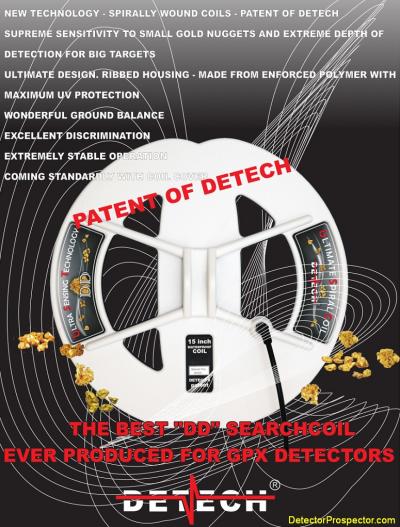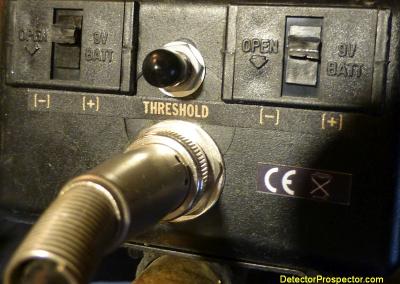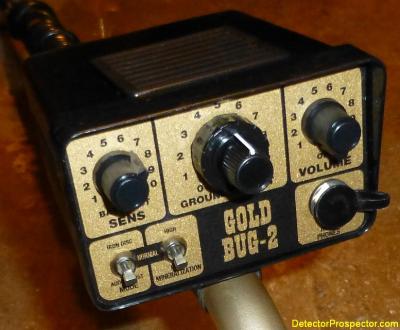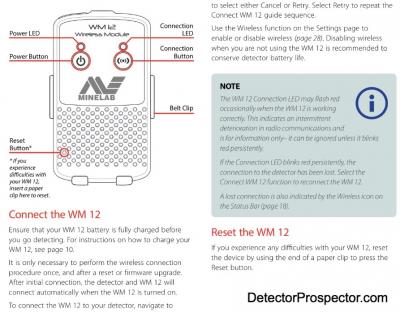-
Posts
19,680 -
Joined
-
Days Won
1,563
Content Type
Forums
Detector Prospector Home
Detector Database
Downloads
Posts posted by Steve Herschbach
-
-
On November 17, 2015 at 10:01 AM, jasong said:
I agree to an extent, but the timings are there for the same reason the hardware and software filtering inside the detector are there and for the same reason we don't have amplifiers with 100x more gain even though we can easily build them. Noise is real and it will mask targets otherwise we'd have detectors that hear a 1 grammer at 10ft - we can make one, we just can't hear the signal in all the noise.
There is a point where adding more ground noise doesn't add anything new to the conversation so to speak unless I'm missing something obvious here... There is only so much ground information you can get before it's not saying anything new in the noise, it's just getting louder. EMI increases along with it and unless you like listening to lightning or meteorites in the atosphere from 500 miles away, it's not saying anything useful. The usefulness is in increasing the noise so you also increase the target response as far as I can tell, but at some point there is diminishing returns and it seems to be part of a detectorists skillset is in determining where that point is at.
The human ear and brain perceives sound non-linearly - which is why the decibel scale is logarithmic. What that means is that a sound that is 10x louder really only sounds 2x louder to us. So volumes that are double really only sound like very faint variations to our brains. Same with frequency shifts (tones). Volumes or tones that only vary slightly are difficult for our brains to differentiate when the noise floor is raised to the same level as the target. There is also the psychological effect that I forget the name of, but our brains get "used" to repetitive senses and automatically dull them out - like how you get used to a smell and don't notice it but someone who just walks in does, or you get used to temperature of a cold lake after diving in, ears are the same.
Anyways, I guess my point is just that running full blast in some cases may be just as counterproductive as running in Fine Gold in places where there is no need for it.
Absolutely, totally agree 100%. It can't be said too many time that there are no absolutes in metal detecting.
-
On November 17, 2015 at 7:37 AM, Swifty said:
I like rockey road ice cream, I like a quite threshold, it allows me to hear very slight changes in what the coil is passing over. Someone else likes vanilla ice cream, they like a noisy threshold. I keep reading the term used, its giving them information on the ground they are swinging their coil over. Let me taste your ice cream! What is this information? I've had stony meteorites. iron stones. and lead that all sound like gold. I've had gold nuggets that sound like pull tabs. What am I missing hear?
I would put it the other way around - we like Rocky Road and you like Vanilla. Rocky road is rough and chunky and vanilla is smooth as can be. First off, nobody is saying you can tell gold nuggets specifically from all other signals. Yes, you better dig pull tabs, lead, and meteorites if you want gold! Those would all be gold signals. The discussion here is all about ground noise and hot rocks. And yes, I dig a lot of hot rocks and some ground signals now and then. Don't think there are magic "gold only" sounds.
Dale summed it up perfectly "I don't ignore any noise I absorb and filter every tiny noise the detector makes and let my mind filter the wheat from the chaff."
There will never be an end to this discussion because what works well for one person does not work well for others. We really are all individuals and our brains are wired differently.
The GPZ and Gold Bug 2 comparison is a good one. Both are very hot machines and can be run in similar fashions. You can take a Gold Bug 2 in all metal mode, and by using a combination of the Mineral setting and Sensitivity control seek to tame the beast. This would mean possibly using the Normal or High mineral setting and lower sensitivity levels in order to quiet the machine down.
I always run a Gold Bug 2 in Low mineral mode no matter what the ground is like, and the sensitivity is always at maximum. I ran it that way in Australia with no problem. What it takes is hours of listening to the machine and training your mind to learn what ground and hot rocks sound like and what targets sound like. It is extremely difficult to describe but genuine targets just sound sharper in general. Again, coil control is critical.
The GPZ is much the same and I would be very uncomfortable if the machine was running dead quiet and giving me no feedback on what the ground is doing under the coil. It is all music to my ears. When I refer to noise I just mean non-target sounds. Ignoring may mean not perking up on non-targets and we can easily get hung up on trying to place exact verbal descriptions on what is going on. The bottom line is some people are able to take in all these audio sounds and process them mentally. What others perceive as noise that drives them crazy is comforting to those who hunt this way.
In Chris Ralph's example he spoke of noise that drove him crazy and made the machine inoperable in his opinion. His assumption was I just could not hear it. Not true. I hear it but it simply is non-target audio information. The key thing is it does not bother me at all and it bothers him a great deal. The difference is in the mind.
There are some very, very good detector operators who would say this is all very, very wrong. They will advise tuning with the goal of seeking the quietest most stable threshold possible. I am not going to argue with any of that because I just do not believe there is only one way to get results with a metal detector. Most importantly I do believe we all have different capacities for listening to the sounds a metal detector makes and processing those sounds and that this requires different tuning methods for many of us. Trying to cram everyone into some one size fits all settings is a mistake in my opinion and I will never advocate that. Learning to use a metal detector well is a journey of sorts that takes time and dedication. I have likened it to learning a musical instrument and I defy anyone to learn how to play the guitar by reading about it on a forum. You will never learn to detect reading about it, you have to go out and put in the hours and dig the rocks and the nails and the bullets and the nuggets and always pay attention in the process to what the detector is telling you and teaching you. Experiment, try different things, different settings, and find what works best for you. But if your goal is to find gold others miss you better be willing to push the machine performance to the limits, and that will always mean accepting some level of signal response that is more aggressive than smooth and quiet.
In theory the perfect detector would just ignore the ground completely and just make good clean solid signals on gold, and metal detectors can be set up and run like that. It is when you are pushing the limits though that you find that by suppressing absolutely all sounds except for the sounds a nugget makes that an edge is lost. The GPX 5000 is a good case in point. People love the Fine Gold setting because it suppresses sounds from nearly all hot rocks. But the good operators know that Normal is more powerful, and that by running in Normal and being willing to dig some of those hot rocks more gold can be found. Sometimes it just boils down to a willingness to dig more signals that turn out not to be gold to find those other signals that turn out to be the nugget everyone else missed.
OK, I just thought of another way of looking at it. Imagine all the possible tuning options as ultimately setting an audio threshold. There is a range from where the detector is reporting 100% of everything it sees all the way down to reporting nothing. The most important thing is that gold nuggets and the ground signal/hot rock signals all overlap to a certain degree. Most nuggets do stand out and so the machine can be set to suppress all other signals and still produce a lot of gold. What gets lost is the borderline gold signals. Instead, you can choose to allow more of these type signals to occur. What the experienced operators know is that we still have not made detectors with processing circuits that equal the human ear and mind. In theory it can be done because there is something we hear that allows us to decide which targets to dig and which to ignore. The machines have not got there yet however and so almost all really good detectorists chose to hunt by ear rather than allow the machine to make all the decisions.
The same discussion goes on all the time with coin and relic hunters and the merits of hunting by ear using tones versus silent search discrimination. Anybody really good at using a DEUS or other machine to pull targets out of ferrous trash should know what we are talking about here. It can get into some real complex discussions - see http://www.metaldetectingworld.com/xp_deus_multi_tones.shtml for example.
If you set the machine to be completely quiet on all trash you can find good stuff. But almost all good operators choose to listen to all the targets under the coil and mentally process the information because the machines themselves just are not up to the task, and those are the operators that extract good finds that everyone else misses. Not everyone has the mental aptitude or patience to deal with all the "noise". It is just something that some people are better at than others. There is a guy named Keith Southern who would be a superb nugget hunter but he lives back east and so he pulls non-ferrous targets out of old sites covered with ferrous junk. Some people give him grief because they say nobody can listen to all that racket and stay sane but the guy simply has superb audio processing skills others lack. I follow his posts because his observations on finding things match up perfectly with my observations on using VLF detectors to pull gold nuggets out of ferrous trash. The methodology is exactly the same as what is trying to be conveyed here with the GPZ and ground/hot rock signals.
Well, I think I have run out of steam and beat that subject up as much as I can. I am just tripping over my tongue trying to express in words what can only be learned in person. Others can add whatever they can think of. I think it is obvious that the GPZ is still a new thing and new ways and methods are still being discovered for getting the best possible performance out of it. I sure do not think I have it all figured out by any means. The day I ever think that somebody shows me something new so I remain a perpetual student of prospecting and metal detecting.
-
 7
7
-
-
It was just an offhand comment, I did not know I was starting something! My intent with the thread was to recognize XP and I certainly admire very much what they have done with the DEUS. It is a great little unit with a lot of very happy owners. I would recommend it very highly to anyone looking to pull non-ferrous targets out of dense ferrous trash.

-
Looks very interesting! Here is a jpg version of the pdf file above and a video. There is a very detailed thread on tests of the coil being done by Nenad Lonic at https://www.prospectingaustralia.com.au/forum/viewtopic.php?pid=203964#p203964
-
I understand it is fine for many people Shelton - I do not dispute that. I do not want to charge my coils - period. I also do not want each coil to basically be an entire metal detector, making what would be a $150 coil into a $400 coil. I am perfectly content with less expensive coils that can be swapped out quickly with a cable connection. As I said, this is my personal preference, not criticism of the company or its products.
-
 1
1
-
-
XP is a company going places and they scored a home run with the XP DEUS in particular. Rechargeable coils are not my cup of tea but I admire what the company has done in pushing design boundaries. When they get around to putting DEUS capability in a more traditional package with less expensive coil options I will have to have one.
Anyway, business has been good for them and they just finished an expansion of their facility to better keep up with demand. http://www.xp-detectors.co.uk/the-new-xp-factory-is-finished/ I wish them success going forward and will keep an eye out for whatever new products they have in the future.
-
I was told in Alaska at Ganes Creek that I was ultra competitive because I always strove to be number one on the finds score board. I tried hard to explain it was not wanting to beat others but only my desire to be very good at what I do. I am always out to learn more and if I see somebody consistently doing better than I then I want to know why and emulate whatever it is that is causing them to show me up. I do like to detect with top notch hunters because it helps me up my game by learning from them.
-
 6
6
-
-
Remember the only thing a detector senses is conductivity, magnetism, and EMI. Anything non-conductive and non-magnetic is invisible, just as invisible as air. All most forest duff or other organics like tundra in Alaska do is add space, just like holding the coil off the ground. But they can't act to "insulate" signals unless there is conductivity or magnetics involved.
-
 2
2
-
-
Thanks for stopping by and providing that explanation Reg. Though I got a chuckle when you say:
"In simple terms, the assumption that a TDI doesn't have enough power to power a large coil is totally false. Instead, the interaction of the filtering inside the detector is the culprit. So, what does this mean? Simple, modify the filtering and you could use larger coils much easier."
Simple for you maybe. I think most of us lack your electronic skills!
-
 3
3
-
-
That is an oddity on the dual battery gold bugs. One battery basically runs the detector and it will actually function with one battery. The other acts as sort of an audio circuit power boost. So old trick was if your bug batteries run real low, swap batteries around and it comes back to life.
-
 2
2
-
 1
1
-
-
Exchange rates are what they are John and nothing White's can do about a strengthening currency for the U.S. and a weakening currency in Australia. White's has always been at a disadvantage because of their stupid marketing policies - witness your difficulty in finding a TDI Pro to buy in the UK. White"s by design made the TDI hard to buy from day one for reasons I may go into some day.
Back to the subject at hand, even Reg would tell you that the TDI was never designed to run large coils and it is just not what it does best. Sure, they can be made to work on the TDI but the circuitry is not intended to be running large coils effectively and that is why you do not see many large coils made specifically for the TDI.
-
 2
2
-
-
Seems like anyone that uses a Gold Bug 2 much flips that iron disc switch back and forth so much it eventually gets loose. There were also periods when the proper star washer did not get used at the factory, and they got loose real quick!
The fix is easy. There is a large shallow nut that holds the coil connection fitting in place below the battery doors. Remove this nut and washer. Of course the coil must also be disconnected.
Now grab the ground balance knob on the control panel and wiggle until the control panel pops loose in the housing. Pull the control panel and guts carefully out a couple inches. There are wires leading from the circuit board to the battery compartments and threshold knob so take it easy. I usually just pull out far enough to be able to see the nut on the backside of the disc switch inside the control box.
If you look at the iron disc switch on the control panel above you will see the round portion has flat sides. You need a tiny wrench to grab hold of this. There is also a loose nut on the backside (that's why the switch is loose) that you can turn with a tiny wrench or a firm grip with needle nose pliers. If the lock washer is missing you can't add one without desoldering wires, so the best bet is to just add a tiny drop of loctite and firm everything up.
Now reseat the control panel, lining the coil connector up properly with the hole, and reinstall the large washer and nut. Job done!
-
 4
4
-
-
The consensus I have seen from experienced detectorists everywhere is that they prefer detecting in damp as opposed to bone dry ground. I generally share that preference but I think it can go either way from a straight up performance perspective. For instance compressed dry forest duff would normally be invisible to the detector, but when wet there may be enough tannin content to set up a weak conductive signal. Something a PI would probably miss but a hot VLF or GPZ??? I know large fern root wads will give off a signal when wet more than dry.
The only issue I have had personally in the Sierras is that it seems no matter where you go even far off the beaten path there are tiny bits of steel flake and wire about. Most from old logging operations but some is like it just fell out of the sky. I can be in a spot where I would swear the only thing that could go beep is gold, and up comes a tiny bit of steel out of the duff. Very annoying.
No matter what after a good rain the air is sweeter and the forest quieter. There are few places I have ever been as nice as the Sierra Mountains.
-
 1
1
-
-
-
It depends on the mineralization level Paul. JP said "unless the surface mineralisation is Minimal." The type of mineralization JP is referring to is far more common in Oz than in the U.S. I have been fine letting my coil ride on the ground.
From the white paper at http://www.minelab.com/__files/f/266297/KBA_24-1%20ZVT%20Technology.pdf
"SATURABLE SOILS
In any of the above settings, it pays to swing the coil an inch or two above the ground surface if the soils are considered saturable (VRM). Saturable means that a detector ground balances well if the coil is raised and lowered down to about a few centimeters above the soil surface, and for the worst saturation, down to several centimeters, but not if the coil is swung up and down to a height lower than these saturation 'height thresholds' (e.g. Down to the soil surface). This is discussed if further detail below."
In other words, it it ground balances fine down to ground level, no problem. And then farther below it goes on to provide more technical details:
"In any of the above settings, it pays to swing the coil an inch or so above the soil surface if the soils are considered saturable (VRM). Saturable means that a detector ground balances well if the coil is raised and lowered down to about a few centimetres above the soil surface, and for the worst saturation, down to several centimetres, but not if the coil is swung up and down to a height lower than these saturation ‘height thresholds’ (e.g. down to the soil surface.) In addition, the degree of (VRM) soil saturation is considerably less for Difficult or Severe than Normal. As the metal detector coil is moved towards a soil, the transmitted magnetic field in the soil gets stronger. This causes a (very) small degree of VRM signal ‘saturation’ that happens to cause the resistive signal relative slope of the tilt to change. This is why the amount of VRM soil saturation is far less for Difficult and Severe than Normal. Soil saturation often requires the user to operate the coil several centimetres above the soil surface for best results."
I posted in even more detail about this in May at http://www.detectorprospector.com/forum/topic/970-minelab-gpz-7000-a-super-vlf-saturable-soil-tips/
The detector will tell you what to do. If the ground is making noise, slow down or raise the coil, or both.-
 2
2
-
-
JP just made a killer post on this subject on the Oz forum referenced earlier. Hopefully he will here - Great stuff!
-
I am going to refer this thread to Minelab. Bugs are always possible when software changes occur, and for obscure uses like dual wireless modules can get missed in testing. There is one way to test this, but it would be a hassle for you. You would have to reinstall the original firmware version and give it a go and see if problem repeats. If not that likely would be the issue, and if upon reinstalling the latest version of the firmware the problem occurred again, then that would pretty much nail it. And if that were the case I can almost guarantee it would get looked at by Minelab as bug and fixed in a future update. All still a bit of conjecture here but certainly a possibility.
-
 1
1
-
-
Nope. As I noted volume is one setting that may need tweaking. If 8 works better for you use 8.
Hearing is funny stuff. I do not have good hearing. But I do have a finely tuned sense of audio change and what constitutes a target. I have always run audio settings on any detector I use quite low from a volume standpoint. All I need to be able to do is barely hear it, but I sure can pick up instantly on variations in what I am hearing. Or so it seems to me. How can I know what I am not hearing?
Kind of like in Chris post. It is not necessarily that I do not hear the stuff that sounds like noise to him and drives him crazy. I just lower the level of the "noise" to where it is comfortable for me to listen to, and the noise goes in one ear and out the other - until that magical difference that indicates a signal.
-
Did you do the firmware update? And if you did, is this something that only started happening after the update?
One of these days I will treat myself to another module. I like the idea of running two.
-
Some glitch in the GPZ then. I wonder how many people have run it with dual modules? Have you tried just a single module? Maybe the software gets confused when changing modes with dual modules.
-
So is it both modules that are losing the signal, or just one?
-
-
All it takes is money. Remote control, needs to move around, needs to dig. Mars Rover with metal detector. Me, I want to be doing it physically. The exercise is worth more than the gold.
-
JP is in a class all his own. There are many people on the forum as good or better than I at both metal detecting and prospecting. I just blab more and so am more visible. But thanks Fred for mentioning me in the same breath as JP - I am flattered!
-
 1
1
-









In The Sixteen to One Mine, California
in Rocks, Minerals, Gems & Geology
Posted
A more detailed version of Chris' original post here has been published on Minelab's Treasure talk at http://www.minelab.com/usa/treasure-talk/metal-detecting-underground